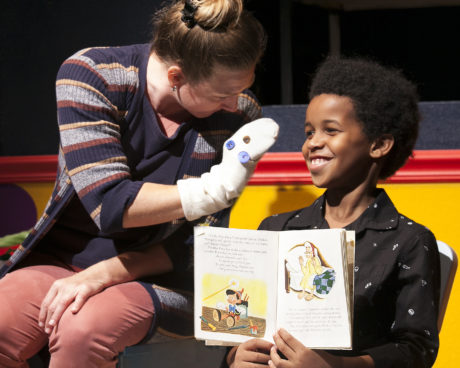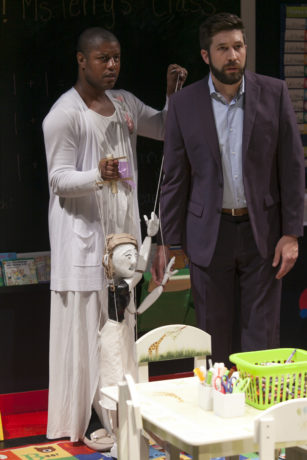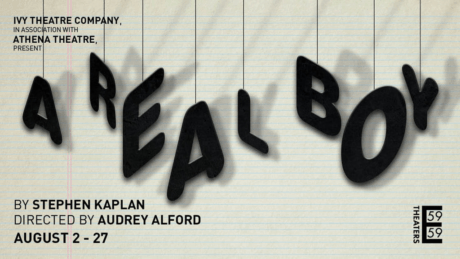In the world premiere of A Real Boy, presented by Ivy Theatre Company in association with Athena Theatre at 59E59, playwright Stephen Kaplan significantly reimagines Italian writer Carlo Collodi’s popular children’s book of 1883, The Adventures of Pinocchio, for an adult audience, with an eye on current socio-political issues in our own country. Directed by Audrey Alford, the show combines sardonic humor with a heated debate and a driving moral about the need for understanding and acceptance of individuality and diversity.
When Max’s kindergarten teacher Terry becomes worried that his palette is restricted to black and white, his knowledge of the world is limited, and his behavior is different from that of his classmates who tease him, she calls a meeting with the school principal, and then with the child’s parents to discuss her concerns. She learns that the human boy was adopted by wooden marionettes Peter and Mary Ann Myers, themselves painted only in black and white. As the conversation with Max’s father becomes increasingly contentious, Terry decides to take matters into her own hands, invoking the legal doctrine of in loco parentis, triggering a public dispute over the rights and responsibilities of teachers versus parents, and, once the boy grows strings, resulting in an awareness that you can’t change the essence of who people are, but must respect and encourage their uniqueness. In the end, it’s his own genuine self-acceptance that makes Max “a real boy.”

Using both puppets (designed and built by Puppet Kitchen) and a diverse cast of live actors as a metaphor for the coexistence of those who are different from one another, the telling of the didactic post-modern tale ranges in tone from witty satire to serious discourse, from full-blown tension to symbol-laden fantasy (which becomes somewhat abstruse at the conclusion, but implies a need to cut the ties that bind, and then to mend them for the greater good). Both sides of the dispute are given an equal voice and equal ribbing, suggesting that there is always a softer grey area between the severity of black and white.
Jenn Remke turns in a fully committed performance as Terry, delivering a heartfelt paean on the joys of teaching (to which all devoted educators can relate), displaying deep affection for her student, and revealing her anxiety-ridden dedication to being politically correct (calling “stupid” a “no-no word” and reading to her class the story of Pinocchio, with which Max was not familiar, “to be inclusive”), then showing her frustration and heartbreak at being unable to change the reality of who Max is. Jamie Geiger is effectively understated as Principal Klaus, portraying him as laughably ineffectual and indecisive, concerned more about retaining his position than making a principled decision. The young Alexander Bello is sympathetic as the conflicted boy, torn between his teacher and his parents, played/puppeteered by Brian Michael and Jason Allan Kennedy George. Though there was some awkwardness with the movements of the marionettes and entanglement of the strings during the performance I attended, both actors convey the distinctive personalities of the Myers. Michael, as Peter, is outspoken in his determination to maintain his household and to raise his son as he sees fit, becoming verbally and physically combative when challenged; George is soft-spoken and conciliatory as Mary Ann, a loving mother who is sadly discontent with her situation and wants only for her son “to be happy.”

Rounding out the cast are Katie Braden and Danie Steel as the ambitious lawyer Jilly Lambert and “Councilperson” Rebecca Landel (not “Councilwoman,” she insists – though her skin-tight low-cut dress clearly reveal her gender identification!), who take opposing sides in the cause celebre, using it to advance their own careers, popularity, and visibility. In contrast with the more subtle performances by the others, they engage in over-the-top histrionics in their farcical characterizations of the overly zealous feminists.
Ann Beyersdorfer’s scenic design paints a telling contrast between the Myers’ stark black-and-white kitchen and the colorful kindergarten classroom, hung all around with children’s arts and crafts, and filled with games, books, and bright crayons. Costumes by Tristan Raines show the same distinctions of hue, as well as indicating the passage of time, supported by Jenn Fok’s lighting, with Terry’s daily change of outfits. And Megan Culley skillfully captures the ambient sounds of the laughing students, the reporting press, and the shouting demonstrators outside the school.
Despite some unclear symbolism at the play’s end, an unexpectedly easy resolution to all the antipathy, the inexplicable transition from puppets into people, and a marked shift in mood from the clever satire of the first act to the full-out theatrics of the second, through the use of humor and imagination, A Real Boy delivers an important message for our troubled times, and a reminder that we should all be valued for who we are, not what others want us to be.
Running Time: Approximately two hours, including an intermission.
A Real Boy plays through Sunday, August 27, 2017, at 59E59 Theaters, Theater C – 59 East 59th Street, NYC. For tickets, call the box office at (212) 279-4200, or purchase them online.





